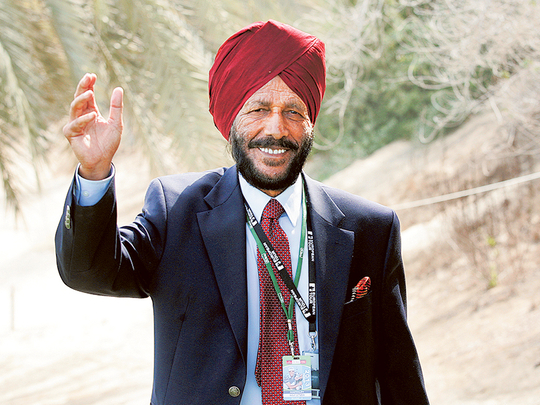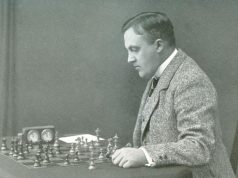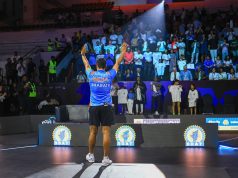The ‘Flying Sikh’ Milkha Singh left the world after a month-long battle with COVID-19, just five days after his wife, Nirmal Kaur, died of COVID; thus reuniting with his “sweetheart wife, who is my heartbeat” in some other world.
With Milkha Singh’s death we lost a piece of history. The achievements of Milkha Singh that has inspired a whole nation will forever remain as the ultimate instance of success, gumption, glory, dedication and discipline.
“You can achieve anything in life. It just depends on how desperate you are to achieve it.”
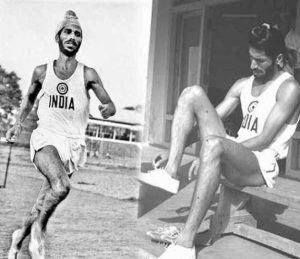 Milkha Singh won the selection trial of the 1956 Olympics but was disappointed at the Games as he failed to get past the preliminary heats. In his autobiography, The Race of My Life, Milkha Singh wrote:
Milkha Singh won the selection trial of the 1956 Olympics but was disappointed at the Games as he failed to get past the preliminary heats. In his autobiography, The Race of My Life, Milkha Singh wrote:
“I returned to India, chastened by my poor performance in Melbourne. I had been so excited by the prospects of being part of the Indian Olympics team, but naively, hadn’t realized how strong and professional the competition would be. My success in India had filled me with a false sense of pride and it was only when I was on the track that I saw how inconsequential my talents were when pitted against superbly fit and seasoned athletes. It was then that I understood what competition actually meant, and that if I wanted to succeed on the international arena, I must be prepared to test my mettle against the best athletes in the world.”
Milkha Singh came back to India totally devastated but determined. He wanted to stay in the race; he trained intensely and made sprinting the sole focus of his life.
“Running had thus become my God, my religion and my beloved. My life during those two years was governed by strict rules and regulations and a self-imposed penance. Every morning I would rise at the crack of dawn and after the usual ablutions, would get into my sports kit and dash off to the track, where I would run two or three miles cross-country, in the company of my coach. After the run I would do stretching exercises to develop my muscles.”
The vigorous training schedules sometimes pushed him to the corner. But self motivation was his key those days. He could often visualize packed stadium cheering for him and he crossing the finishing line victorious.
“I practised so hard and so strenuously that often I was drained of all energy and looked pale as death when the session was complete. There were times when I would increase my speed to such an extent that after my rounds, I would vomit blood or drop down unconscious through sheer exertion. My doctors and coaches warned me, asked me to slow down to maintain my health and equilibrium, but my determination was too strong to give up. My only focus was to become the best athlete in the world.”
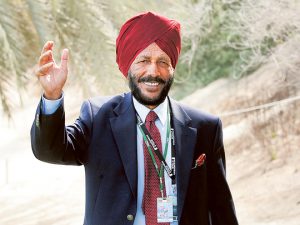 Milkha Singh was a four-time Asian Games gold-medallist but his greatest performance was a near miss, the fourth place finish in the 400m final of the 1960 Rome Olympics. His timing at Rome remained the national record for 38 years. Milkha Singh won the gold in the then 440 yards race of the 1958 British and Commonwealth Games. He became the first Indian athlete to win an individual gold in a Commonwealth Games, which led to then Prime Minister Jawaharlal Nehru declaring a national holiday on his request.
Milkha Singh was a four-time Asian Games gold-medallist but his greatest performance was a near miss, the fourth place finish in the 400m final of the 1960 Rome Olympics. His timing at Rome remained the national record for 38 years. Milkha Singh won the gold in the then 440 yards race of the 1958 British and Commonwealth Games. He became the first Indian athlete to win an individual gold in a Commonwealth Games, which led to then Prime Minister Jawaharlal Nehru declaring a national holiday on his request.
“Adulations and glory can be a double-edged sword that can make or break a celebrity. In the world of sports, fans follow and cheer their favorites particularly when they win and break records, but the moment their hero flatters, their allegiance moves to the next rising star.”
But Milkha Singh always remained a star in his lifetime; the star that would shine even brighter on the other side of this world.

